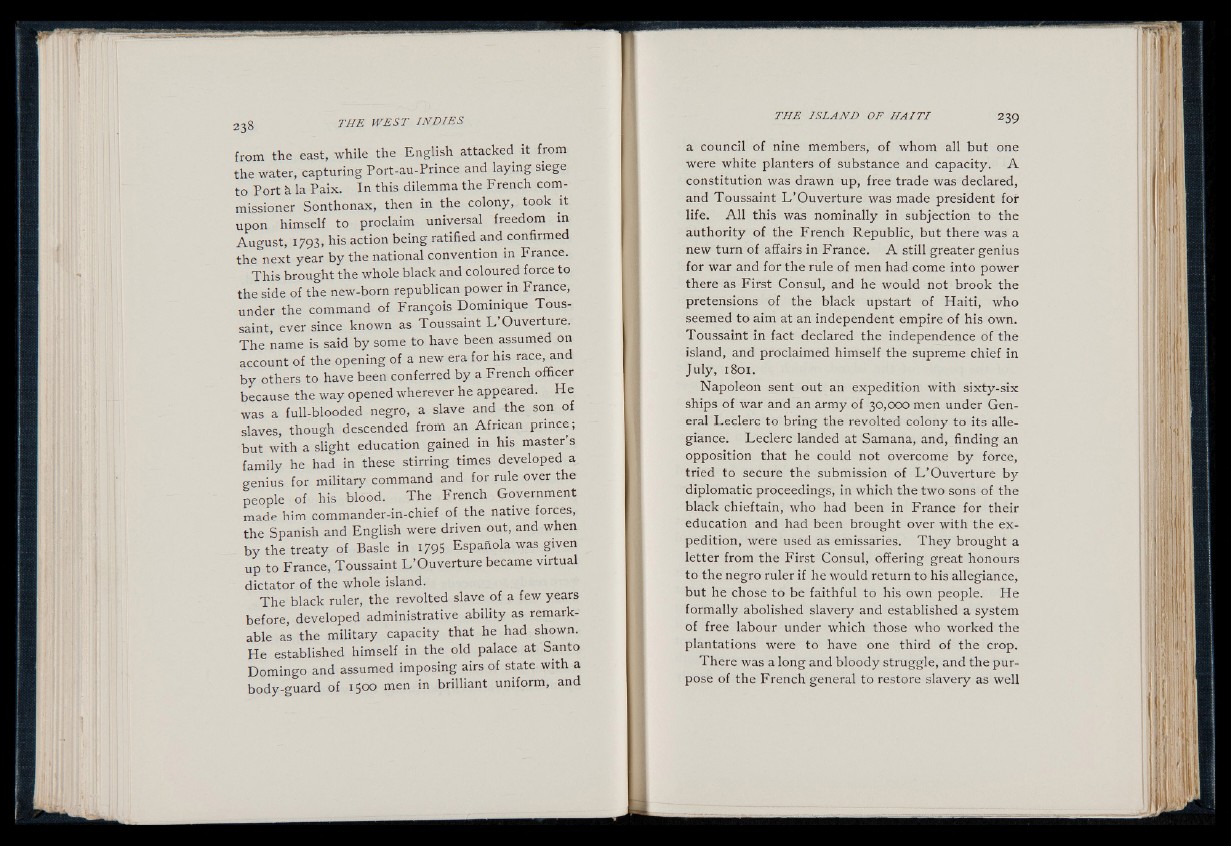
from the east, while the English attacked it from
the water, capturing Port-au-Prince and laying siege
to Port à la Paix. In this dilemma the French commissioner
Sonthonax, then in the colony, took it
upon himself to proclaim universal freedom in
Au gust, 1793, his action being ratified and confirmed
the next year by the national convention in France.
This brought the whole black and coloured force to
the side of the new-born republican power in France,
under the command of François Dominique Toussaint,
ever since known as Toussaint L Ouverture.
The name is said by some to have been assumed on
account of the opening of a new era for his race, and
by others to have been conferred by a French officer
because the way opened wherever he appeared. He
was a full-blooded negro, a slave and the son of
slaves, though descended from an African prince;
but with a slight education gained in his master’s
family he had in these stirring times developed a
genius for military command and for rule over the
people of his blood. The French Government
made him commander-in-chief of the native forces,
the Spanish and English were driven out, and when
by the treaty of Basle in 1795 Española was given
up to France, Toussaint L ’Ouverture became virtual
dictator of the whole island.
T he black ruler, the revolted slave of a few years
before, developed administrative ability as remarkable
as the military capacity that he had shown.
He established himself in the old palace at Santo
Domingo and assumed imposing airs of state with a
body-guard of 1500 men in brilliant uniform, and
a council of nine members, of whom all but one
were white planters of substance and capacity. A
constitution was drawn up, free trade was declared,
and Toussaint L ’Ouverture was made president for
life. A ll this was nominally in subjection to the
authority of the French Republic, but there was a
new turn of affairs in France. A still greater genius
for war and for the rule of men had come into power
there as First Consul, and he would not brook the
pretensions of the black upstart of Haiti, who
seemed to aim at an independent empire of his own.
Toussaint in fact declared the independence of the
island, and proclaimed himself the supreme chief in
July, 1801.
Napoleon sent out an expedition with sixty-six
ships of war and an army of 30,000 men under General
Leclerc to bring the revolted colony to its allegiance.
Leclerc landed at Samana, and, finding an
opposition that he could not overcome by force,
tried to secure the submission of L ’Ouverture by
diplomatic proceedings, in which the two sons of the
black chieftain, who had been in France for their
education and had been brought over with the e x pedition,
were used as emissaries. T h e y brought a
letter from the First Consul, offering great honours
to the negro ruler if he would return to his allegiance,
but he chose to be faithful to his own people. He
formally abolished slavery and established a system
of free labour under which those who worked the
plantations were to have one third of the crop.
There was a long and bloody struggle, and the purpose
of the French general to restore slavery as well